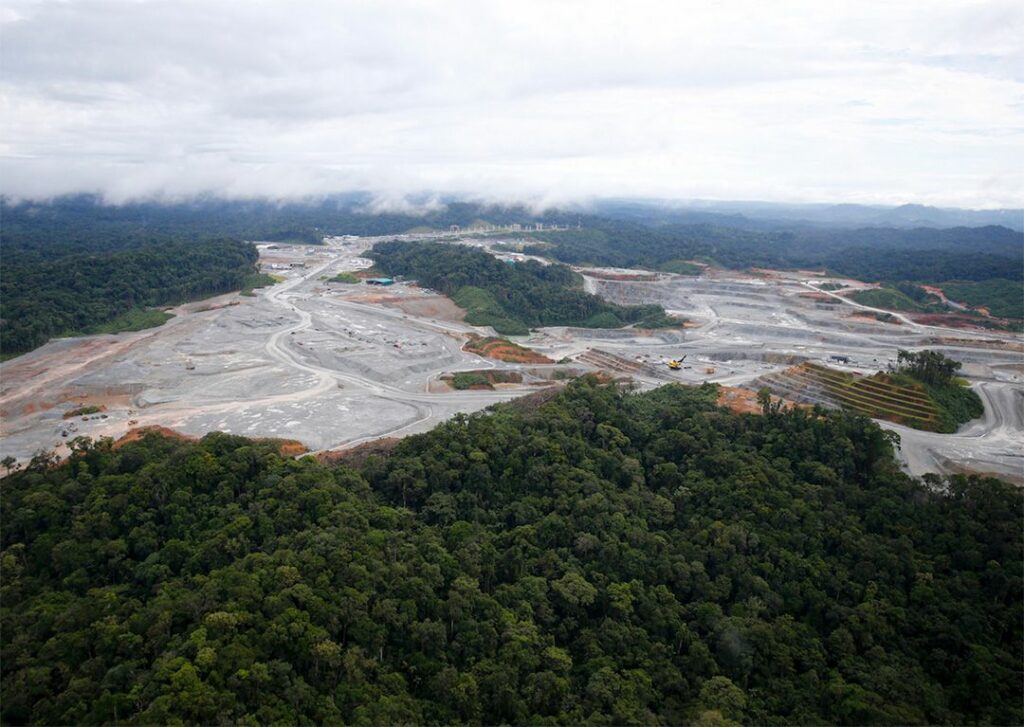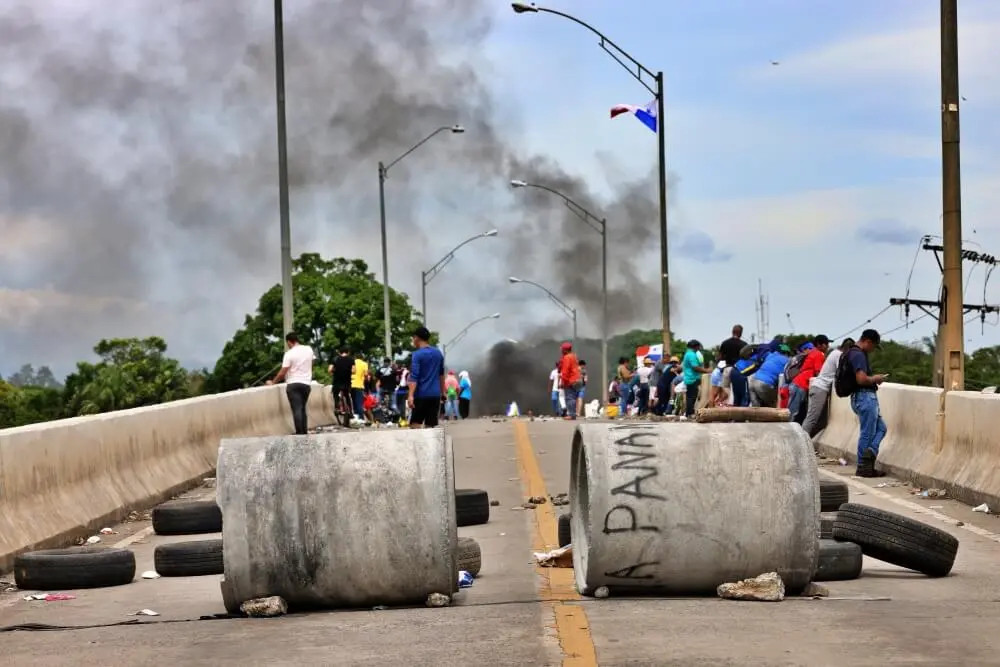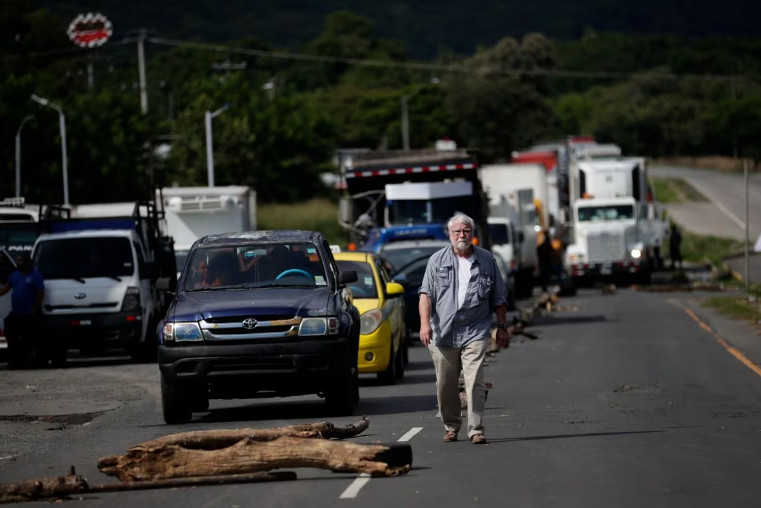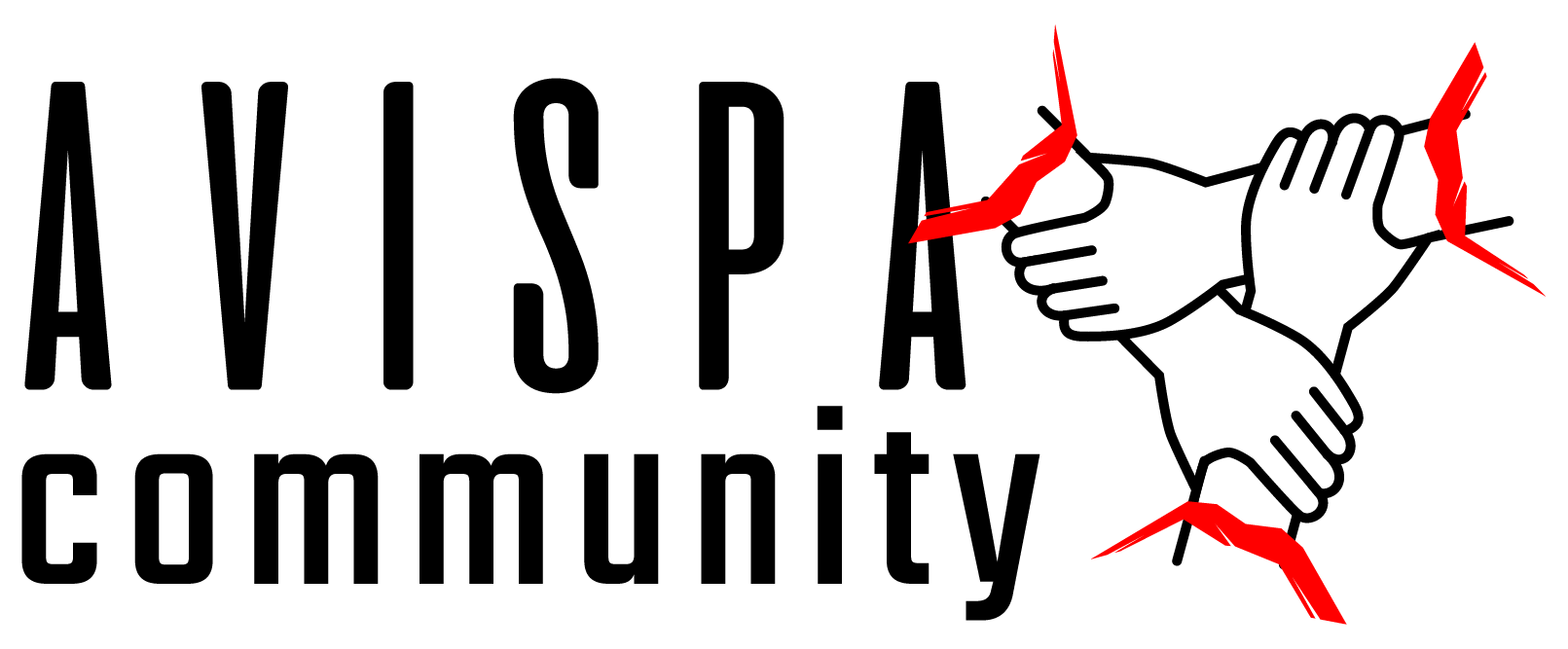Protests have not stopped against the approval of the largest mining project in Central America.
Going on one month, the people of Panama have maintained uninterrupted mobilizations throughout the county, in rejection of Law 406, which approves a mining contract with Cobre Panamá, the largest open pit mining project of copper and gold in Central America. Protests have continued despite state repression.
Since October 23, social organizations, unions, professors, and the public in general have protested against a contract signed between president Laurentino Cortizo and Minera Panamá, a subsidiary of the Canadian company, First Quantum Minerals (FQM). The agreement authorizes the Canadian corporation a mining concession for 20 years, which afterwards can be renewed, to exploit nearly 13,000 hectares in Coclé del Norte, in the province of Colón, which would devastate tropical forests that are part of the Mesoamerican Biological Corridor.
Local media outlets have reported that as of last weekend, more than 1,000 protestors have been arrested. Among the detained are 134 minors. According to official reports, those who have been arrested are accused of vandalism, property damage, and other administrative offenses.
Mining Contract
This particular mining concession has a history that dates back to the 1990’s. In 1991, the concession was granted to explore possible gold and copper deposits. In 1997, the National Assembly approved the mining contract. In 2005, the Panama government supported infrastructure construction, and in 2009, the green light was given to begin commercial exploitation of the mine by the company that at the time was known as Minera Petaquilla (also of Canadian origin).
The contract for the exploitation established the possibility of renewal after 20 years, as long as the request was filed with the Ministry of Commerce and Industries 120 days before or after the end of each period. On December 30, 2016, the mining company filed for the extension, after completing the exploration stage and spending five years on the construction of the Cobre Panamá mine.
However, in 2017, the Supreme Court of Panama declared the original contract from 1997 unconstitutional. The ruling responded to a claim filed in 2009 by the Environmental Advocacy Center of Panama (CIAM), which argued that the cancellation of mining activity was necessary to prevent damage to the ecosystems in the northern part of the country.

Minera Petaquilla changed its name to Minera Panamá, and in February of 2017, it was granted an extension to operate until 2037. The Environmental Advocacy Center claims that the supreme court ruling had already nullified the contract. For their part, the mining company argued that the judicial ruling doesn’t affect their project, which has an investment of more than 10 million dollars. However, in order to operate the mine, they agreed to negotiate a new contract, which was done with the current president Laurentino Cortizo, and ratified in October as Law 406.
Rejection
The response from different organizations like the Central General de Trabajadores de Panamá and the Asociacion de Profesores de la Republica, as well as environmentalists, Indigenous peoples, campesinos, and students has been massive. The state repression, they say, has been excessive.
The protests continue in anticipation of the Supreme Court ruling on the constitutionality of the law. In November, mobilizations have increased, demanding the president call an extraordinary session of the National Assembly in order to repeal Law 406.
According to local media, in addition to the road blockades in the capital of Panama, protests have been recorded in the provinces of Veraguas, Chiriquí, and Colón. In some areas, there are blockades impeding the circulation of goods and fuel, especially on the border with Costa Rica.

The alternative media project Radio Temblor has emphasized the participation of Indigenous peoples in the protests, who have maintained barricades in the district of Ngäbe Buglé, “as there has been no response from the government to repeal the law.” They also emphasized that, in spite of the blockades, the transit of ambulances, along with vehicles carrying medicine and food, is being allowed.
“In the Coclé province, actions have been concentrated near the entrance to the mine, as well as protests of fisherman at the dock of the mining project in Punta Rincón. Protests also continue in the provinces of Colón, Darién, Los Santos, and Herrera, as well as in Indigenous areas of Guna Yala, Nasos, and Emberá,” explained the independent media outlet.
Assassinations
Four people have been killed during the mobilizations.
On October 26, 49-year-old, Agustín Rodríguez Morales, died after being run over by a vehicle during a protest in the community of Los Viveros, in the province of Colón. On November 1, Tomas Milton Cedeño, a teacher in the district of Ngäbe Buglé, originally from the province of Chiriquí, was run over during protests in Horconcitos.
During blockades on Tuesday, November 7, in the province of Panamá, Kenneth Darlington, a Panamanian citizen originally from the United States, assassinated Abdiel Díaz Chávez and Iván Rodríguez Mendoza. The 77-year-old killer remains in jail awaiting trial.

On November 9, demonstrations demanded justice for the assassinated. “Panama, now more than ever, should be united because we cannot allow more blood to be shed in this country to defend a transnational company…the blame should not be placed on the blockades,” declared Luis Arturo Sánchez, of the Asociación de Educatores Vergüenses.
Repeal
After massive mobilizations, president Cortizo presented Law 407 which would prohibit new mining concessions. However, protestors demand the repeal of the contract with Minera Panamá.
Meanwhile, on November 8, the Ministry of Commerce and Industries (MICI) announced that it is in the process of reviewing all new, renewal, and extension applications for exploration and/or extraction of metals in order to comply with law 407.
However, experts warn that this decree maintains 15 active concessions, and leaves more than 100 existing applications pending. According to the MICI, all applications must be filed in a period of three months of the enactment of the law, which went into effect on November 3.
The Centro de Incidencia Ambiental detailed that there are 103 mining exploration applications that must be filed by February 2024 at the latest, in order to comply with the new law.
However, according to the CIAM, there are still 15 concessions that have been granted. Of those 15, four have expired, and seven are waiting an extension. Thus, they would also be excluded.
Of the four remaining concessions, two belong to Veragold, located in the province of Veraguas. In that region, according to the law protecting the watershed of the Santa Maria river, mining is prohibited, so extraction could not begin. There is also the Minera Petaquilla, backed by law 9 of 1997, which has been declared unconstitutional.
The only concession that would remain active is that of Minera Panamá, which was recently legalized with Law 406, and which has been hit with more than 8 lawsuits questioning its constitutionality in the Supreme Court.


